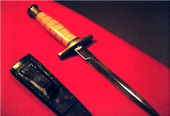Dagger: Difference between revisions
SPYRIDONM1 (talk | contribs) (→Alternate Names: added ice pick) |
VANKRASN39 (talk | contribs) |
||
| Line 40: | Line 40: | ||
*'''stiletto''' General Use |
*'''stiletto''' General Use |
||
*'''tanto''' General Use |
*'''tanto''' General Use |
||
*'''sidearm-of-Onar''' |
|||
== Legendary Daggers == |
== Legendary Daggers == |
||
Revision as of 21:42, 12 September 2015
A dagger is one of the most commonly used weapons in history. It is a short-bladed weapon used primarily for stabbing or thrusting. It evolved from prehistoric tools and initially were made of basic materials, such as stone or bone. In GemStone, they are a very fast weapon. Daggers are one of the fastest weapons, having only a one second roundtime and a three second minimum roundtime. The only weapon faster is the bare fist.
Construction
Like most bladed weapons, daggers consist of primarily two parts: the blade and hilt.
Blade
The blade of a dagger is exceedingly short, approximately 6 inches long. The dagger blade is usually narrow and pointed, designed for thrusting and stabbing. The use of a fuller is not uncommon, but is usually only for aesthetic purposes. The only thing common between all daggers is that the blade is designed for stabbing.
Hilt
The hilt of a dagger usually consists of the crossguard, handle, and pommel. As compared to the longsword, the pommels of daggers were significantly smaller, as they do not have to act as a counterweight to the blade. In the case of a handle that is bolted to the tang, pommels were not even used. With the wide variety of daggers, there is no real standard to their construction.
Uses
Daggers have many uses aside from being merely weapons. They're used in fletching for paring arrows, cutting the shafts to length, nocking them, and for cutting the tip. They're also used in the Rogue Guild skill, Rogue Gambits and for cutting the cord when disarming a scales trap. They also serve as excellent tools for skinning critters.
Alternate Names
One of the oldest and most widely used weapons in existence, the dagger has been called many names. This is a list of currently acceptable alternate names for dagger based weapons.
- alfange Alterations Only
- basilard Alterations Only
- bodkin General Use
- bracelet dagger General Use
- butcher knife General Use
- cinquedea General Use
- crescent dagger General Use
- dirk General Use
- fantail dagger General Use
- forked dagger General Use
- kidney dagger General Use
- knife General Use
- kozuka General Use
- ice pick General Use
- misericord General Use
- parazonium Alterations Only
- pavade Alterations Only
- poignard General Use
- pugio Alterations Only
- scramasax General Use
- sgian achlais Alterations Only
- spike General Use
- stiletto General Use
- tanto General Use
- sidearm-of-Onar
Legendary Daggers
- ShadowDeath Daggers - Most ShadowDeath weapons are daggers. There are a few weapons of other types, such as the handaxe.
Game Mechanics
The dagger is a low damage, high speed one-handed edge weapon. Although it can be used against any opponent, it is best suited vs unarmored or lightly armored targets. Even with its low damage factors its effectiveness can be enhanced when used in conjunction with ambushing because critical weighting, based on the ambush skill, is applied to the attack; thus, the dagger is able to overcome its low damage as long as the initial damage is sufficient to inflict a minimum rank 1 critical. An especially effective tactic for ambushers is to aim the dagger at the eyes of the target. The eyes have a low instant death critical rank threshold from puncture and slash damage.
| Weapon | AG | Cloth | Leather | Scale | Chain | Plate | RT | Min RT | Damage Type | STR/DU | ||||||||||||
|---|---|---|---|---|---|---|---|---|---|---|---|---|---|---|---|---|---|---|---|---|---|---|
| AsG | 1 | 5 | 6 | 7 | 8 | 9 | 10 | 11 | 12 | 13 | 14 | 15 | 16 | 17 | 18 | 19 | 20 | |||||
| Dagger | DF | .250 | .200 | .100 | .125 | .075 | 1 | 2 | Slash/Puncture | 18/195 | ||||||||||||
| AvD | 25 | 23 | 22 | 21 | 20 | 15 | 13 | 11 | 9 | 10 | 6 | 2 | -2 | 0 | -6 | -12 | -18 | |||||
The standard dagger has a weight of 1 lb.
Note: To edit this table go to Template:Weapon table dagger
See Also
Related Articles
- Edged Weapons - The skill required to use a dagger effectively.
- Forging - Player-forged weapons can have up to a 6% bonus to the weapon's AvD and DF.
